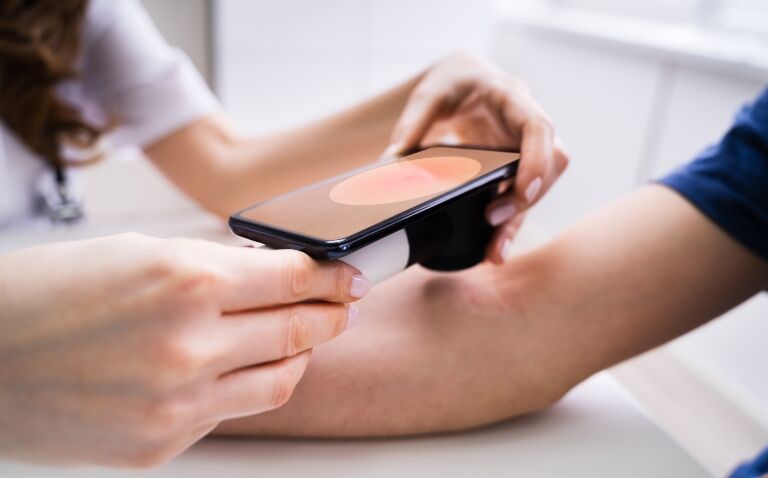Skin cancer diagnosis will be achieved faster and closer to homes as the NHS is set to accelerate the rollout of teledermatology across specialist services and GP practices.
The diagnostic technology, which involves taking high resolution images of spots, moles or lesions on people’s skin, uses a small lens the size of a 50p piece attached to a phone camera. Known as a dermatoscope, it enables specialist dermatologists to double the number of patients they can review in a day.
Currently used in about 15% of trusts offering dermatology services, teledermatology is set to be rolled out to all areas of the country by July this year.
The use of dermatoscopes is also being expanded across GP practices and community diagnostic centres, which can support people living in rural communities to get a faster diagnosis without having to travel for a specialist appointment or avoid the requirement to attend a specialist.
This means people will be able to start treatment more quickly, helping to reduce waiting times and improving chances of survival.
Some hospitals are seeing almost all patient’s diagnosed and treated for skin cancer within two months of an urgent GP referral thanks to teledermatology, according to the NHS.
Skin cancer checks on the rise
According to the NHS, more than 600,000 people have been referred for skin cancer checks in the last year – almost a tenth (9%) higher than in the previous year and double the number sent for checks almost a decade ago. Over 56,000 patients with skin cancer received treatment last year.
According to Cancer Research UK, There could be around 26,500 new cases of melanoma skin cancer every year in the UK by 2038-2040, projections suggest.
Announcing the rollout, NHS chief executive Amanda Pritchard said: ‘There is no denying that increased demand has placed huge pressure on services, but championing the use of digital technology and new ways of working is key to reducing waits and is exactly why we are accelerating the use of teledermatology – it is a small piece of kit that has the potential to speed up diagnosis and treatment for tens of thousands with skin cancer.’
Somerset GP Dr Tom While said: ‘Being able to get a swift and specialist opinion on a skin lesion or rash, and advice on treatment or local surgical options, often negates the need to refer the patient on to another hospital to see the specialist in person. This not only reduces waiting lists, but strongly benefits my patients who live in rural areas, saving them from long unnecessary journeys.
‘If a patient does need to be referred on to a specialist, then the teledermatology service helps to streamline that process, ensuring the patient is seen in the correct clinic at the right time.’
AI-supported diagnostic technology
Magnifying lenses that use artificial intelligence technology to identify the presence of cancerous skin lesions are also being trialled by the NHS.
Ms Pritchard highlighted that the technology is ‘proving highly effective in areas that have trialled the technology so far’, with 10,000 unneeded face-to-face appointments avoided so far.
The technology, known as Deep Ensemble for the Recognition of Malignancy (DERM), is initially being used alongside clinician assessments, but it is hoped it will provide both faster and more accurate skin cancer detection.
Neil Daly, founder and CEO of Skin Analytics – the company behind the DERM technology – said: ‘Our mission is to help more people survive skin cancer and by providing easier access to skin cancer assessments and we are excited to help additional hospitals see more patients faster through the use of our DERM technology.
‘The NHS’s decision to roll out DERM to support teledermatology is another positive example of the NHS championing world-leading technologies and the next generation of dermatology pathways.’










